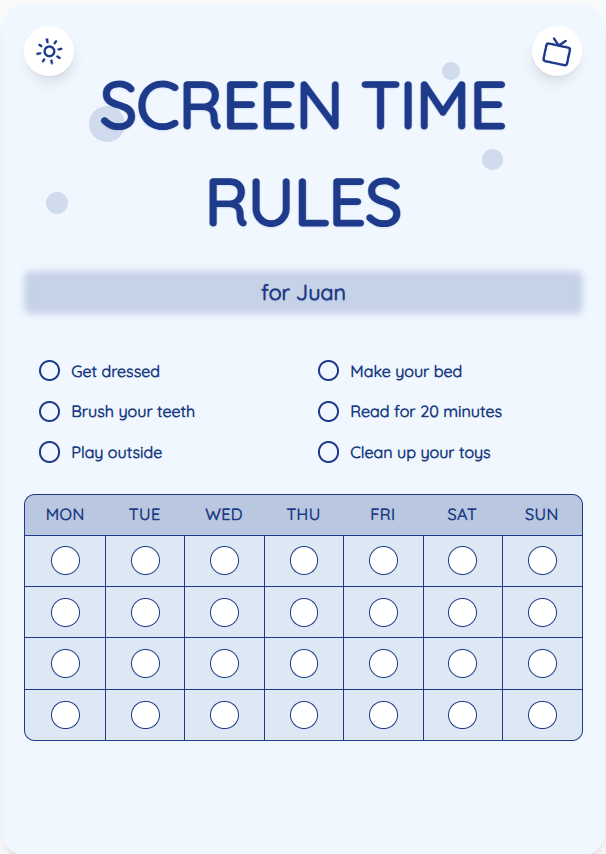Effective Strategies to Limit Screen Time for Kids
As a parent, managing your child's screen time can be challenging. Finding the right balance between technology use and other activities is crucial for their development. In this guide, we'll provide you with actionable advice and practical tips to help you set limits on screen time effectively while promoting healthy habits and family harmony.
See What Your Screen Time Chart Will Look Like
Here's an example of a beautiful, customizable screen time rules chart you can create for your family

Understanding the Impact of Excessive Screen Time
Excessive screen time can have negative effects on children's physical health, mental well-being, and social skills. Research shows that prolonged screen time can lead to issues such as obesity, sleep disturbances, and behavioral problems. By understanding these impacts, parents can make informed decisions about managing their child's screen time.
Setting Clear Screen Time Rules
Establishing clear rules around screen time is essential. Create a daily or weekly screen time schedule that includes designated time for homework, physical activity, and family interactions. Consistency is key in enforcing these rules, so make sure your child understands the expectations and consequences of exceeding screen time limits.
Put These Tips Into Action
Create a custom chart to implement these strategies with your child
Encouraging Alternative Activities
To reduce screen time, encourage your child to engage in alternative activities such as outdoor play, reading, creative arts, or hobbies. Provide them with a variety of options to choose from and participate in these activities together as a family. By promoting diverse interests, you can help your child develop new skills and interests outside of screens.
Using Screen Time Charts as a Management Tool
Screen time charts are effective tools for visualizing and managing your child's screen time. Utilize online resources like ScreenTimeRules.com to generate personalized screen time charts based on your family's rules and preferences. These charts can help track usage, set goals, and reward positive behavior, making it easier for both parents and children to monitor screen time limits.
Practical Tips for Success
- Create a screen-free zone in certain areas of your home.
- Limit screen time before bedtime to promote better sleep quality.
- Use parental control settings on devices to restrict access during specific hours.
- Lead by example and demonstrate healthy screen time habits for your child.
Frequently Asked Questions
How much screen time is recommended for children?
The American Academy of Pediatrics recommends limiting screen time to 1-2 hours per day for children ages 2-5 and establishing consistent limits for older children.
How can I make screen time rules more effective?
Involve your child in creating the rules to increase their buy-in and understanding. Be flexible in adjusting rules as needed based on your child's behavior and needs.
What are the benefits of reducing screen time?
Reducing screen time can lead to improved physical health, enhanced cognitive development, better social interactions, and increased opportunities for learning and creativity.
By implementing these strategies and tips, you can effectively manage your child's screen time and promote a healthy balance between technology use and other activities. Remember, moderation is key in fostering your child's overall well-being and development. Visit ScreenTimeRules.com to create personalized screen time charts that support your family's screen time management goals.
Ready to Transform Your Family's Screen Time?
Join thousands of parents who have successfully managed screen time with our customizable charts.
